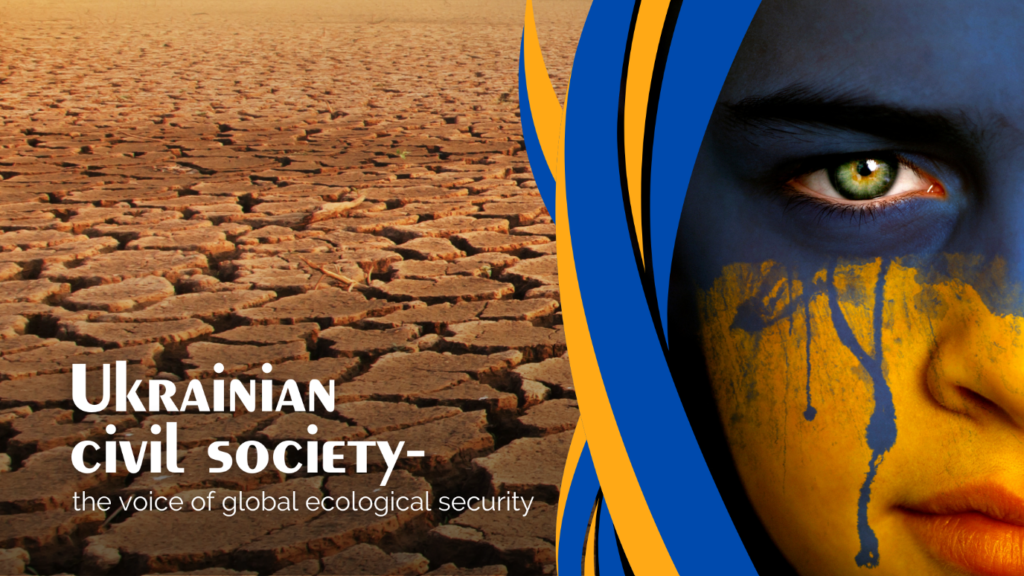The representative of the EPL participated in a webinar of the European Parliament addressing the ecocide in Ukraine caused by Russian military aggression. The webinar was organized by Member of the European Parliament Viola von Cramon-Taubadel and her team.
Representatives of environmental organizations from Germany, France, as well as Members of the Verkhovna Rada of Ukraine also took part in the webinar.
Tobias Münchmeyer from Greenpeace, in particular, discussed the value of Ukraine’s nature for the region and Europe’s biodiversity, as well as the level of Ukraine’s integration into relevant EU structures and what this integration could mean for mitigating the consequences of ecocide.
Inna Sovsun, a Member of the Verkhovna Rada of Ukraine, emphasized the efforts of the Ukrainian side (government, opposition) in combating Russian ecocide. She also highlighted the need for assistance that Ukraine as a whole, and the environment in particular, requires.
German Bundestag member Anton Hofreiter emphasized the role of the environment in the process of post-war reconstruction in Ukraine from the point of view of Germany and the EU. He discussed in detail the possible measures that the international community, including Germany, the EU, and G7, can take to hold the guilty parties accountable and prevent future acts of ecocide in Ukraine and beyond.
Olena Kravchenko (EPL) gave a brief description of environmental destruction in Ukraine caused by the Russian Federation. Olena noted that the war in Ukraine is a global-scale ecological disaster. The impact of the war on the environment knows no borders, as the circulation of air, water, and animal migration spreads its consequences worldwide. Therefore, according to her statements, it is vital to ensure effective overcoming of the ecological consequences of the war and to provide for a genuine post-war green recovery.
Furthermore, Olena pointed out that while the loss of human lives during war is horrifying, the explosion of the Kakhovka Dam vividly demonstrated that severe ecological consequences can also be deadly and kill people, although not always immediately noticeable. Apocalyptic scenes of drifting houses, dead people and animals, thousands of hectares of fertile land flooded, areas covered in dead fish, and completely ruined cities and villages only show a fraction of the damage inflicted on the environment by war. The waters contaminated with chemicals from rockets, agrochemicals, and fuel substances from damaged ships and vehicles enter the Black Sea, thus spreading their deadly effects worldwide.
Since Ukraine holds a quarter of the world’s fertile black soil reserves, the fact that it has been severely damaged and contaminated with toxic substances and landmines poses a huge global threat. 30% of Ukraine’s territory is contaminated with explosive objects and requires demining efforts. This accounts for 176,000 square kilometers. The restoration and demining process will take decades, and some areas are so heavily destroyed that their restoration is unlikely.
Rocket strikes and powerful bombardments have caused massive forest fires. This not only results in thousands of hectares of burned forest, but also the destruction of entire ecosystems, the loss of flora and fauna, including endangered species. According to the Accounting Chamber of Ukraine, as of the end of 2022, 3 million hectares of forests have been destroyed, which accounts for almost one-third of all Ukrainian forests. This undoubtedly has a significant negative impact on the global climate.
The consequences of damage and toxic pollution resulting from military actions are particularly serious, considering that Ukraine is home to 35% of Europe’s biodiversity, and hundreds of protected areas have been occupied or have been occupied, including 23 national parks, nature reserves, and biosphere reserves.
The loss of biodiversity caused by the war is unprecedented, and scientists estimate that 2 to 6 species have become extinct as a result of the conflict. Missile strikes, fires, chemical spills, and other factors are causing extensive damage to vegetation, including rare and endangered species. As the war disrupts migration routes for many bird species, the conflict can lead to a significant decline in bird populations across Europe and potentially even globally. This also applies to species that are already threatened with extinction.
Before the war, Ukraine already had significant environmental problems, but the unprecedented damage inflicted by the conflict has made the environmental aspect a matter of survival not only for Ukraine but for the entire world.
Unfortunately, the system of environmental governance and the institutional capacity of relevant authorities in Ukraine are too weak to address the problem of such a catastrophic scale. Unfinished key institutional and sectoral environmental reforms make the prospects of a truly green recovery a fiction. The environment is life, and there can be no compromises when it comes to life. It is vital that the environmental dimension receives proper attention and becomes a priority in the process of post-war recovery in Ukraine. Consolidation of efforts by national and international stakeholders is necessary to ensure real progress in implementing environmental reforms as a key prerequisite for Ukraine’s green recovery.
This publication was prepared by ICO “Environment-People-Law” as a part of Enhance Non-Governmental Actors Activeness Program ENGAGE funded by the United States Agency for International Development (USAID) and implemented by Pact in Ukraine. The views expressed in this publication are the sole responsibility of PACT and its partners and do not necessarily reflect the views of the United States Agency for International Development (USAID) or the United States Government.



